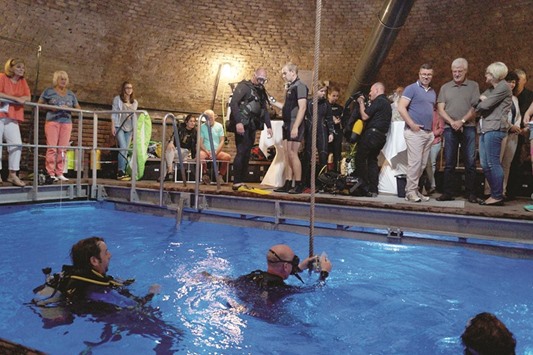With his grey top hat, red waistcoat and watch chain, Juergen Schmidt has evidently dropped in from a different century to guide tour groups through Wittenberge, a former industrial town halfway between Berlin and Hamburg.
Today he is playing the role of Salomon Herz, a Jewish entrepreneur who traded in grain and rapeseed oil and helped turn this insignificant town on the River Elbe into a thriving manufacturing centre.
Herz established Germany’s first oil trading company and ensured that a rail link to Berlin was built. The building housing the press is now a hotel, with one of the old tanks converted into an indoor climbing wall, while the other is a plunge pool.
The old tower for loading and unloading the riverboats is now the hotel’s “Beach Bar,” from where the new promenade along the Elbe can be viewed with its joggers and cyclists.
As he leads his tour party through the streets Schmidt recalls the days of communist East Germany, when Wittenberge had a population of 32,000 and was home to industrial concerns. Today that population has dwindled to 17,500.
A factory making sewing machines was originally set up by the US company Singer in 1902, with the company insisting that a river port had to be built. In the 1920s it was expanded, with a huge clock tower that remains the city’s best known landmark to this day.
The factory continued under the Singer name until World War II, and after that production went on under a different name until 1992.
“Look out below,” a woman shouts from above, and Schmidt’s group turns its eyes upwards to the top of the half-timbered house, where a head in an old-fashioned white nightcap looks out of the window as she empties a chamber pot.
“Mr Salomon! I didn’t know you would be walking along here with your guests,” she shouts. Schmidt explains that this method of getting rid of the “night soil” was standard into the second half of the 19th century.
“There was no sewage system,” he says. Right up to World War I few houses had indoor toilets or bathrooms, and a weekly visit to the bath house in Steinstrasse was routine for those who valued personal hygiene.
“It was in use into the 1970s,” Schmidt says.
The walls on the church square at the heart of 19th century Wittenberge still have the iron rings where animals were tied up. Livestock were traded here, the deal being sealed with a glass of local schnapps.
At this point Hedwig, the pharmacist’s wife shows up offering the local brand of herbal liquor. “It’s purely medicinal,” says Hedwig. “You’re looking a bit pale. Have a glass.”
Burkhard Genth is standing in front of the local museum in a black suit and bowler hat, playing the role of Karl Singer. The museum, a half-timbered structure, dates back to 1669.
As a centre of the sewing machine industry Wittenberge is home to a large collection. At its peak the town was producing 300,000 sewing machines a year, many for export.
“In the 1980s it was the town’s biggest employer with a staff of 3,200,” Genth says. The last model was developed in 1989 — the year the Berlin Wall came down — but never went into production. —DPA

Part of the old oil press is now a plunge pool.
